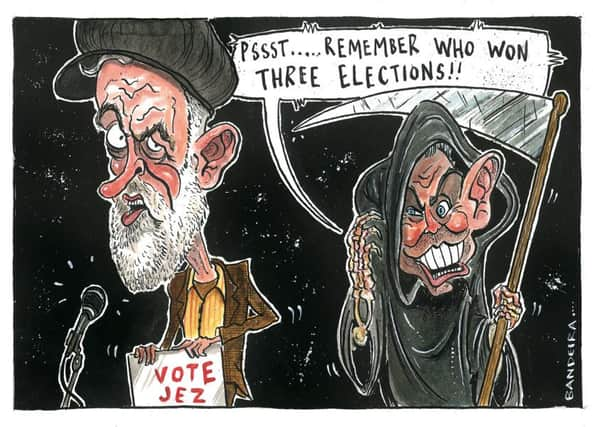Mark Stuart: Blair’s Iraq legacy at root of Corbyn’s rise


Throughout this extraordinary leadership contest, Tony Blair has repeatedly warned his party not to return to the dark days of the early 1980s. Sensible Labour grandees ranging from Neil Kinnock to Charles Clarke and Gordon Brown have echoed his concerns. And yet, such siren voices have gone unheeded because of the toxic Blairite legacy over Iraq.
I write as someone who changed their party affiliation because of Blair’s misguided invasion of Iraq in 2003, but I am not prepared to stand idly by and see the rest of his remarkable legacy trashed by so-called “progressives”.
Advertisement
Hide AdAdvertisement
Hide AdIt is worth recalling the position of Labour as a party of government prior to Blair becoming leader following the sad death of his predecessor John Smith in May 1994. Between 1945 and 1997, Labour infighting and weakness on the economy combined to leave the party with just nine years in government in which it enjoyed a substantial majority in the House of Commons.
Compare that with Blair and his successor Gordon Brown, who gave Labour 13 continuous years of power between 1997 and 2010 with a comfortable majority.
And because Labour were in government for those 13 years, the party was able to deliver on a series of progressive policies.
I could name 50, but here are just five: devolution to Scotland, Wales and Northern Ireland; the abolition of hereditary peers; the introduction of a national minimum wage; Bank of England independence and a reduction in the age of consent for homosexuals from 18 to 16 years.
Advertisement
Hide AdAdvertisement
Hide AdCompare that impressive record in government with Labour’s manifesto in 1983, which proposed, amongst other things, unilateral nuclear disarmament, withdrawal from Europe and the nationalisation of all major British companies. No wonder Gerald Kaufman dubbed it “the longest suicide note in history”. Labour suffered a shattering defeat under Michael Foot and did not return to power for another 14 years.
As the late Philip Gould, Blair’s polling guru pointed out in his provocative book The Unfinished Revolution in 1999, the Labour party of the early 1980s betrayed its own traditional supporters with a diet of dismal dogma and extremism.
And let us be clear: Jeremy Corbyn is merely a cuddly version of the late Tony Benn, believing in nearly all the discredited policies from the Bennite era.
What Corbyn and Benn suffer from is a severe case of what might call “Oppositionitis”.
Advertisement
Hide AdAdvertisement
Hide AdThis is a chronic condition that can afflict political parties. In the most extreme cases, politicians may experience a heightened sense of ideological purity, combined with periodic bouts of windy rhetoric. The symptoms can persist for years, unless treated with a dose of political realism.
The reality is that almost all Oppositions are marginalised both in Parliament and by the media. All they have is words in the House of Commons or empty protests outside it.
As Blair showed, it is only by attaining and keeping power that real change can be implemented. Being in government is what counts.
Tony Blair and Gordon Brown understood that in order to gain power, Labour first had to win the trust of those voters not naturally aligned to the centre left.
Advertisement
Hide AdAdvertisement
Hide AdIn various incarnations, these voters have been known as “Mondeo Man”, “Worcester Woman” or even “Aldi Mums”, but they all share a common aim of being aspirant, of wanting to get on in life, rather than being held back by ideology.
Modern voters are like consumers, much more interested in branding, how leaders present themselves and economic competence.
The idea that Labour lost the last general election because it was insufficiently left-wing is just wrong. A majority of voters currently lean to the centre right, not to the centre left.
Key marginal seats in towns like Milton Keynes, Reading and Swindon shifted decisively to the Conservatives in 2015 because risk-averse voters did not trust Ed Miliband’s Labour party.
Advertisement
Hide AdAdvertisement
Hide AdAnd yet Blair won all the aforementioned Southern English seats in his landslide of 1997. If Labour is not to suffer what the former Labour MP Giles Radice called “Southern Discomfort”, it has to win back voter trust, and only a Blairite leader is capable of doing that.
If Jeremy Corbyn is elected today, things are likely to get worse before they get any better.
Rather like 1981, large swathes of the right of the Labour party will have to decide whether to stay and fight their corner, or break away (as the “Gang of Four” did) to form another party. Many leading Labour politicians will refuse to serve in Corbyn’s Shadow Cabinet, weakening its authority. Either Corbyn will burn out after a couple of years in the spotlight or a leader with courage will have to challenge and defeat him.
So, why despite all the evidence, have Blair’s warnings been cast to one side?
In a word: Iraq.
Advertisement
Hide AdAdvertisement
Hide AdWith that debacle went Blair’s magic ingredient – trust. In this context, the sooner the much-delayed Chilcot inquiry report into the Iraq war is published the better. It could act as a powerful enema, flushing the poison out of Tony Blair’s record in government.
Only then will Labour supporters be able properly to appreciate the achievements of the leader who remains their greatest-ever election winner.
• Mark Stuart is a political academic and writer from York whose biographies include John Smith, a former Labour leader.